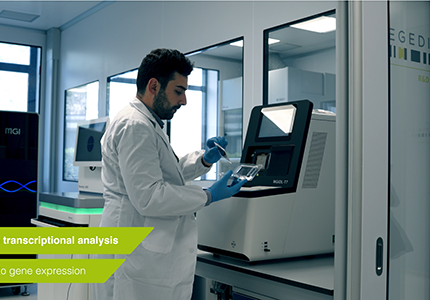Intestinal flora, as a complicated microbial ecosystem, forms mutualistic symbiosis with human beings and plays an important role in multiple aspects such as human physiological metabolism, development of diseases, and immune system. Therefore, understanding intestinal flora's role in the development of chronic diseases is significant to the prevention and treatment of diseases.
In December 2022, MGI's automated ultra-low-temperature biobank (MGICLab-LT) was delivered to Shanghai Engineering Technology Research Center for the Functional Development of Human Intestinal Microflora (hereinafter referred to as "the Engineering Center"), contributing to building "the Chinese Intestinal Model Bacteria Bank". We spoke with Professor Huanlong Qin, President of Shanghai 10th People's Hospital and Dr. Ni Ming, Senior VP of MGI, about MGICLab-LT.
What's the Engineering Center's original intention to introduce MGI's automated ultra-low-temperature biobank (MGICLab-LT)?
"At the inception of the Engineering Center, we were facing the challenge to transfer healthy people’s feces into bacterial liquid and capsules. The preservation of intestinal flora is one of the major problems we have encountered." Said Professor Huanlong.

Professor Huanlong Qin, President of Shanghai Tenth People's Hospital
Microorganisms are prone to contamination, mutation and even death in the process of use and passage, which often results in the decline of bacteria and the possible loss of superior bacteria. The significance of bacteria preservation lies in the following aspects: It maintains the vitality and stability of the original properties of bacteria to a maximal extent; it protects bacteria from death, mutation, and contamination; it sustains the superior properties of strains without decline and guarantees the survival of superior strains. As a result, bacterial preservation can facilitate research, exchange, and application. MGI's automated ultra-low-temperature biobank is perfect to meet the needs for long-term stable preservation of microorganisms.

MGI's automated ultra-low-temperature biobank
What does MGICLab-LT role in supporting the Engineering Center to build the first "China Human Intestinal Flora Bank" in China?
"The preservation of samples is of great importance for the research of the evolution law of chronic diseases based on intestinal microbiome, metagenomics and metabonomics. The scientific connection between the incidence and development of chronic diseases and the flora is a controversial issue regarding the sequence of change of flora and the evolution of diseases. The flora plays a pivotal role in changing the evolution of diseases and the phenotypes." added Professor Huanlong.
To this end, the construction of sample libraries is particularly significant for the research of projects involving large samples and populations, for it can provide a better utility guarantee for the exploration of the evolution and development law of chronic diseases. Additionally, the construction of sample preservation platforms will lay a foundation for the subsequent database construction. It is believed that these platforms will offer more valuable services to society, the medical care and health sector, and scientific research in the future.
How will the MGI's platform empower users in fields like microbiology based on MGICLab-LT?
"Our ultra-low temperature automated biobank is designed to complete automated preservation of samples, information input and precise tube selection under an ultra-low temperature environment. In the future, we hope to realize sample utilization in the whole chain from sample collection and preservation to sequencing and analysis empowered by MGI's platforms." Said Dr. Ni Ming.

Dr. Ni Ming, Senior VP of MGI
To meet the preservation requirements for massive samples of human intestinal flora, especially the requirements for automated sample preservation involving biosafety and data security, with the features of safe, stable, intelligent, and efficient, MGICLab-LT simplifies complicated and tedious operations and provide automated and accurate access to biosample at single-tube level to achieve closed-loop control of the whole process. MGICLab-LT can be customized to realize ultra-low temperature large-scale storage of 500,000 to million samples.
Innovative technology and instruments have a great potential beyond imagination into the foreseeable future. MGI is committed to building a comprehensive life science ecosystem of core tools featuring genetic reading, writing and storage to meet the human's fundamental needs, and empower the application of FMT technology in chronic diseases.



 Sequencer Products: SEQ ALL
Sequencer Products: SEQ ALL














 Technologies
Technologies Applications
Applications Online Resources
Online Resources Data Bulletins
Data Bulletins Service & Support
Service & Support Introduction
Introduction Newsroom
Newsroom Doing Business With Us
Doing Business With Us Creative Club
Creative Club













